Category — Travel
Where I belong
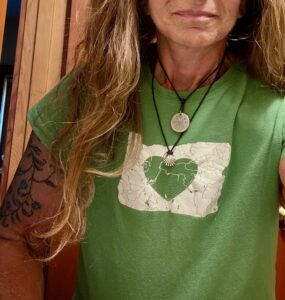
Driving the backroads through Scio, Sublimity and Silverton, Willamette Valley farmland, green, alive, so quietly beautiful that I have to stop the car by the side of the narrow road to catch my breath (and, okay, dab my eyes). Pastures, orchards, vineyards, little tree farms, sheep, rolling hills. For the thousandth, millionth time since I moved here four decades ago, I think: This is my home. This is my home. I am a Willamette Valley girl.
I remember when I first set foot Oregon. I stayed in a tiny, hand-made cabin at a long-established commune out Fall Creek where the folks made dulcimers and gardened in the nude. They had goats and made goats’ milk yogurt and ice cream. There was an 18-month-old who ran around diaperless and peed everywhere. There was a startlingly beautiful 20-something man who whacked at weeds wearing a flowing dress he had designed and sewn himself.
After a few days, I made my way into Eugene where I strolled down 13th Avenue. I was walking past the House of Records when I was suddenly overcome with this feeling. It overtook mind and body. Oh, and spirit too. Not to be overly dramatic. But it was overly dramatic. That was the precise moment I felt…at home. That was the moment I said to myself: Ah ha, this is how people feel when they feel at home. I had never felt that before. I had lived various places in New York, Illinois, and California, some of which I had hated, some of which I had liked, none of which I had loved.
Later that afternoon I sat with a cup of herbal tea at Mama’s Homefried Truckstop where a guy with a guitar was singing John Denver’s Country Roads. I didn’t like John Denver. And Country Roads was about West Virginia. But when that guy sang, “take me home to the place where I belong,” I was a goner. To belong. I didn’t know I was (cliché alert) waiting to exhale. But I was. Although I have traveled a lot through the years, although it was necessary to live other places before I was able to return to Eugene, I have never wanted to live anywhere else.
I think, with all due respect to my husband of three decades and the (very few) other men to whom I have said “I love you” –and excluding my children because my love for them comes from an entirely different, unfathomly deep place—it may be that the love affair of my life is with the Willamette Valley, with my home.
June 7, 2023 1 Comment
Songs sung solo
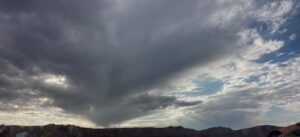
Does sharing an experience make it sweeter, deeper, more meaningful?
When I was part of a bonded pair, when I had Tom, I never really thought about this. So very many experiences were shared—not just the dailiness of life but the epic Pacific to Atlantic camping trip, the Canada to Mexico camping trip, all those European adventures, those months in Crete, the miles we put on exploring Tallin and Riga, getting hopelessly dangerously lost in Istanbul, that magical week and a half in Iceland, that trip to Costa Rica, our last, when Tom was between chemo infusions. But we also took many solo trips, some for research or work, others because we enjoyed different things, had different interests, because we needed a break from each other, because really I don’t know why. We just did.
When I was by myself traveling in central and eastern Europe, when I was invited to spend time in Doha, when I ventured several times to Mexico, I didn’t wonder if I was missing something by being alone. I chose to be alone. I wanted to be alone. I needed to be alone. And I knew, upon my return, someone was there to welcome me home and listen to my stories. Thus, some of those solo experiences were, indeed, shared—in the telling if not in the moment.
Now there is no one sitting at home wondering how or what I’m doing. There’s no one waiting for my stories. Out and about, when I see something—that orange-ringed headless snake on the hiking trail yesterday, that inky storm cloud taking up half the sky this morning—I don’t say to myself I can’t wait to tell Tom about this.
You would think this makes me sad.
But this is not a sad story. Do I wish he were still alive? Of course I do. But his not being here, his not being available to share random moments of discovery or beauty, weirdness, humor, disgust, whatever, means I stay in those moments longer. I inhabit them rather than immediately make stories out of them to share. And so, in this way, the lack of the option to share an experience deepens, sweetens, and makes more meaningful that experience.
This is what I tell myself.
May 24, 2023 4 Comments
The something of nothing
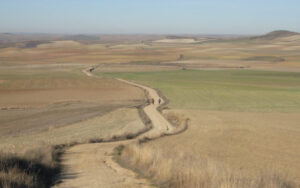
Ah, the meseta. The great interior plateau of the Iberian peninsula. Hot, dry, vast, solitary. It is day 14, although in truth I have stopped thinking of time like this. Each day on the Camino is its own perfect—or not-so-perfect–self-contained little narrative. Yet as the days continue, they begin to lose these hard edges. For all that they are distinct—the landscape, the weather, the people–they are the same: I awake in the dark, put on the same clothes, lace up the same shoes, heft the same backpack. Walk. Stop for café con leche. More than once. Eat the lunch I packed the night before, always the same: cheese, bread, red peppers. Walk some more. End the day sleeping in surroundings more humble than I ever could have imagined. Awake in the dark. Walk.
But leaving Burgos after an indulgent rest day, after a night luxuriating between crisp sheets in a private room, after a full day of day of wearing flip-flops and strolling through parks, the meseta now spreads out before me. And it is something else. Officially, the meseta runs from Burgos to Astorga, about 220K, but the heart of it, the vast nothingness of it, the bleak, flat, emptiness of it, runs maybe half that distance. These are long days of staring at far-off horizons and failing to see, often for many hours, a single sign of human habitation. These are days where a single tree in the distance takes on mirage quality, and you think: Is that a church steeple? Could that be a village? You walk three more hours and find out it is just a tree.
My first day of walking the meseta, from Burgos to an isolated albergue (aptly named the Oasis) is the most challenging 10 hours—yes, 10 hours–I’ve experienced so far. The walking itself is easy. The terrain is flat; the ground is solid. But the landscape is so overpoweringly empty, so seemingly endless, I lose a sense of myself. Of my actual body moving through space. If that sounds trippy, it’s because it is. It is both deeply discomforting and absolutely liberating. Sometimes simultaneously.
That day is half slog, half trance. I would like to report that as I trudged along I thought big thoughts. Or any thoughts. Or that insights and revelations flooded my sensory-deprived brain. Nope.
But I can report this: At the almost empty Oasis albergue, the owner invites me to sit on the little front porch that faces out to the nothingness and brings me a glass of cold water. Then he does my laundry and hangs it out on the line to dry. It comes back to me folded with a small shell necklace on top.
“No sane person fears nothingness.”
― The Tibetan Book of the Dead (yes, Uma’s father)
February 15, 2023 2 Comments
Camino magic
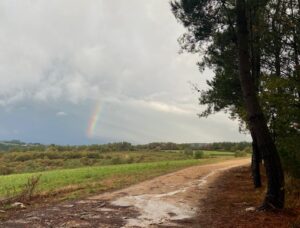
A charming man from the Netherlands operated a tiny tienda next to the albergue in Larrasoaña, my third stop on the Camino Frances. I ordered a café con leche at his place and listened, for the better part of an hour, to his stories. He had walked the Camino thirteen times, he told me. His stories had the air being oft-told, so it is possible that, over time, he had embroidered a bit. It seemed he had created a legend, modest though it was, around himself.
Nevertheless, I listened with great curiosity because I could not imagine why, with all the places in the world to explore, with all the extraordinary hikes through extraordinary landscapes, this guy would choose to walk the same 490 miles thirteen times. As I walked on, I met other repeat Camino pilgrims. Or heard first-timers vow they would return.
It was a mystery to me, this urge to repeat, this do-over mentality. Oh yes, the countryside was extraordinary as the path meandered across undulating plains, roamed through olive groves and vineyards, ventured across both arid flatlands and green rolling hills; as it traversed the cobblestone Calle Major of tiny villages both quaint and (no other way to say this) sorry-ass. The experience was extraordinary, a potent and often unexpected ping-ponging between daily grind and dazzling revelation. But do it again? And again?
Now more than three months since I returned from my trek, I think I understand. I think it is because those Camino lessons in simplicity, focus and clarity, in what matters and what doesn’t, in the camaraderie of souls, in delighting in the ebb and flow of life, those lessons learned while walking, those lessons you told yourself you’d never forget…they are damned hard to hold on to.
I remember thinking, so very many nights, sleeping between paper sheets or in a bunkbed or in a room of snorers “I’ll never take my quiet bedroom with my big bed and my flannel sheets for granted.” And then I did. Within days. ”I’ll never take an evening in front of the fire reading a book for granted.” And then I did. “I’ll never forget that you can be independent and interdependent simultaneously, that receiving help and being helpless are not at all the same, that things make sense when you stop trying so hard to make them make sense.” How to hold onto all this?
I think people walk again and again to recapture these moments, to relearn the lessons, to sink back into the magic. That’s what I am attempting with my writing.
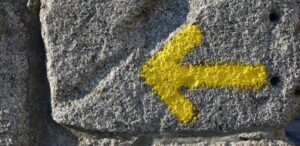
February 8, 2023 8 Comments
Lost and found
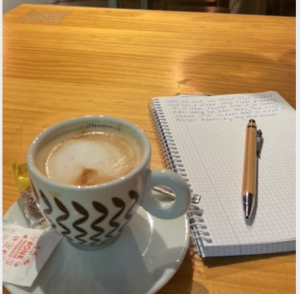
“I feel comfortable in the world in a way I have never felt before. Never in my younger life. Never in the life I just recently left to be here. I am in a foreign country, among strangers, where I know too little of the language, finding (and sometimes not finding) my way, often clueless. Yet there is this peace.”
I wrote this in a blue spiral notebook I bought on day six of the Camino in a shop in Estella that I happened upon while lost on winding streets trying to find my way to my albergue. I was lost a lot. That late afternoon, I was really lost. I happened upon the shop by pure accident and enjoyed a moment of feeling like I knew what I was doing. I needed a notebook. And I actually remembered the word for notebook in Spanish. So I asked the man behind the wooden counter for a cuaderno. I also asked him donde esta mi albergue…and he laughed and pointed across the street.
A week later I was sitting in a little café in Burgos taking a rest day and transcribing the voice memos I had made while walking. This, the one about feeling comfortable and at peace, was one of them. I listened to my own slightly breathless voice with the crunchy sounds of my footfalls in the background. And I wrote in the blue notebook.
I remember everything about this café, how I found a little corner table upstairs and had the space to myself, how I teared up when I heard Ray Charles singing “Georgia on my Mind” over the sound system, how I felt bone-tired and overflowing with energy at the same time, and oh, the creaminess of the café con leche. I had to order another. But as I transcribed, I didn’t remember what prompted me to record this note to myself. Was it a particular moment? A conversation I had with a fellow pilgrim? The mountain views that felt like home but weren’t?
It is three months to the day I wrote this in the blue cuaderno. And only now do I think I know what I meant back then:
When you leave everything behind, you encounter the essential you. Boy does that sounds cheesy. Or bumperstickery. But bear with me, friends. I mean you have the opportunity to encounter, to be, that person who is not attached to things or people, who, for the moment, has no home. You are without portfolio. No one knows your backstory. You are not who you were. You are who you are. Who you forgot you were. And truly, there is peace in that.
January 4, 2023 5 Comments
We don’t meet anyone by chance*
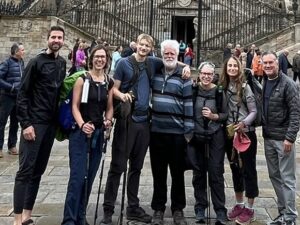
Harry. “Harry, like the Prince,” he says to me, introducing himself, “Harry, like Potter.” Harry is a 23-year-old from London, fresh out of university and an expert in everything, from literature to philosophy to finance. He lectures me on Aristotle and the existence of alternative realities, on the proper footware for the Camino. I can’t wait to lose him along the way.
Joan. She walks slowly and encourages you to walk ahead. She will catch up at the next village, she says. And she does, always. She is 79, bird-like in body with eyes that dart everywhere and take in everything. At dinner one night, a raucous pilgrim meal in an impossibly crowded room, she asks for a second bottle of wine, even though our little table hasn’t polished off the first. And she gets up and takes the bottle over to a table with four South Korean girls we all know from the trail, and she pours them each a glass. And then takes the bottle over to the next table where three guys, Italians, sit. One gets up and hugs her. Another smiles, slyly, “You want to get us drunk and take advantage of us, don’t you?” he says.
Alexander. He injured a tendon and has been sidelined for a week in a tiny village inhabited by more goats than people, an outpost with one church, one restaurant, one bar. Every day he borrows a guitar from the guy who owns the bar, sits in the sun and plays. He asks me what I’d like to hear. I tell him Dylan. He sings it in French. I think: I could stay here for a while.
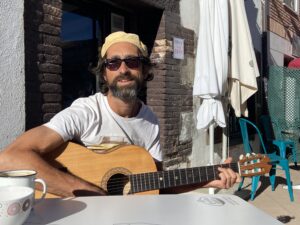
Maria, from the Netherlands, who carries her demons with her. Yevgeny, the son of Russian Jews who fled to Israel. Michael from Derry who has his first of a half-dozen beers at 10 in the morning. Emily, quiet and sweet. Jo, who never seems to have a down day. Andre, a young man in search of himself. Hans, from Norway, the big tough guy who calls his 6-year-old daughter every night.
On the Camino, enmeshed in the intimacy of that fluid community, you learn a lot about people. I don’t mean the facts of their lives, although there is that. I mean what kind of people they are: humble or vain, talkers or listeners, people who observe, who are curious and struck by wonder. Or not. People who think you are interested in seeing the x-rays of their bunion surgery that they happen to have saved on their iphone. People who tell you they went to the same middle school as Joan Didion and assume, oh-so-correctly, that this will forge a bond. People with a sense of humor, with a sense of purpose, with no sense at all.
*Avijeet Das, a poet and a writer from New Delhi, India.
December 14, 2022 4 Comments
Who are we?
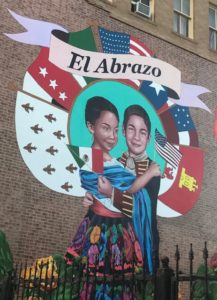
We do not hate each other.
We are not warring tribes.
We are mostly decent people. Yes we are. And we mostly want the same things in life. Yes we do.
I know it doesn’t feel like that. I know that it seems there is vitriol and hostility everywhere, that evil prevails, that conflict is the norm. I have a few things to say about that.
There’s a journalistic axiom: When a dog bites a man, it’s not news. When a man bites a dog, that’s news. In other words: What makes the news is the unusual event, the oddity. The one car crash during rush hour, not the tens of thousands of commuters who make it home safely. The one distraught mother who harms her baby, not the millions who love and protect their children.
Before media streamed, drowning us in 24/7 content, before we carried the world in our pockets, back when tweets were what birds did, those who studied news content and journalism’s “man bites dog” proclivities discovered what they called the Mean World Syndrome. When asked about crime, when questioned about their personal safety and the health of their communities, people vastly overestimated trouble. They thought crime was far more prevalent than it was. They believed their chances of being a victim were far in excess of reality.
I think we are suffering right now from a version of Mean World Syndrome brought on by the masterful cooptation of the news cycle by the nastiest, meanest in our midst, aided and abetted by our bloated media diets, and sharpened by our ignorance of how real people really live.
I don’t claim to be an expert on how real people really live. But I know a lot more now than I did before my husband and I went on two camping trips that criss-crossed America (first coast to coast, then border to border) and brought us face-to-face with places and people in the massive “fly-over” zones that make up most of our country. We stuck to two-lane highways, spent time in towns you never heard of, ate breakfasts in diners, chatted up postmistresses and state park workers, waitresses and grocery clerks, people whose families had lived in the same towns for generations.
For these past 12 days, on this latest trip from the Canadian to the Mexican border down the country’s middle on Route 83, I experienced the country not via my news feed but through personal interactions. And I was heartened by what I saw and heard, by the Black, white and brown kids playing together in the school yard, by the blended Anglo-Mexican families picnicking, by friendly greetings on the street, by the everydayness of life lived in communities that are well loved by the people—the diverse people—who make these places their home. (Read this New York times piece about rural America.)
September 18, 2019 3 Comments
Lessons from abroad
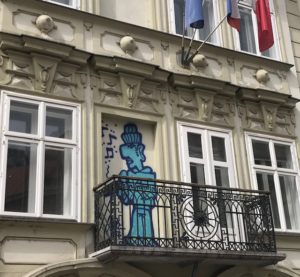
I’ve just sent three days in the little county of Slovenia, a place I could not previously have located on a map. It has been its own country only since 1991. Like so many of the countries of this region, it has a long brutal history of being under someone else’s thumb: The Romans, the Ottomans, the Habsburgs, the Nazis, the Soviets. What is it like to not be your own self? To be subsumed by Empires, and later to be sloppily stitched together in a sprawling fabricated political entity, created out of other countries with their own languages and cultures, histories and traditions, ruled over by an even more sprawling political entity?
I don’t know. And as a visitor for a mere three days (even though I sought out and listened to many stories during that short time), I don’t want to pretend to know. But I can pass along observations. What I heard in this country was both pride and humility. “We are such a young country,” they say (humble) “but we were chosen as European’s greenest city.” (pride). And then they laugh, pointing to the three-year-old commemorative flag still flying over a government building. “We just can’t take it down,” they say. (poking gentle fun of themselves)
I learn that the main river in this small country has seven different names because it goes underground through limestone caves and then emerges seven times. Back before much was known about geology, it was thought that each was a separate river. Now they know differently, but still Slovenians refer to this the river by these different names. This city is known as the Dragon city, and I hear two completely different stories that explain the name, both told with equal enthusiasm and mythological depth. Either could be wrong, the teller of these tales says. Or either could be right. Or both.
And I think: How liberating to live in a country where you can say such things without irony or snark. I love how nuance is a natural part of life because it is how you have to live, how generations have learned to live, when your footing is on shifting sand.
A final word about this country: In the main square of its capital, Ljubljana, there is a large impressive statue. It is not of a general or a war hero or a president. It is of a poet.
April 10, 2019 No Comments
Paint. Write. See.
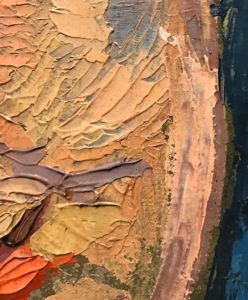
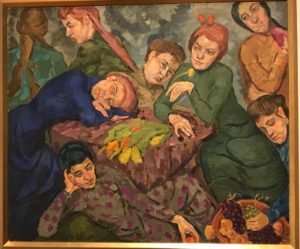
My mother and my grandfather were both painters, she in oil, he in watercolor. I grew up surrounded by their art. I watched my mother at her easel. (I was once her unhappy model.) But until a few days ago, standing in front of a painting at the Stradt der Frauen exhibit, I never thought about a particular similarity between the work of a painter and the work of a writer.
I don’t mean the obvious similarities: the canvas/ the page; the paint/ the words. I mean something about the way the work is done, the purposeful nearsightedness and farsightedness of the work.
Let me explain. I was walking through one of the rooms in the exhibit and found myself skirting a small group of people clustered around a painting, The Dreamers, by Helene Funke. She was one of the more than dozen forgotten or overlooked women painters of the early 20th century being rediscovered and celebrated in this exhibition.
Historical aside: “Forgotten” and “rediscovered” are loaded words here. She was actually quite well known in French circles before the first World War and established a reputation in Vienna, despite hostile criticism coming from the male-dominated cultural scene. After the 1938 Anschluss (the German/Nazi take-over of Austria), modern art was banished and her work, as well as the work of many others, disappeared. It was not until 2007 that she was rediscovered.
Okay, back to the lower Belvedere and the exhibit. In skirting the group, I found myself just inches away from the canvas. This is not how I look at art. From a nose away, it is all brush stroke and palette knife, thickness and featheriness, color laid on color. It is not art. It is craft. It is the work itself. The detail. You see how the sausage was made. You have to stand back to see the sausage itself.
How like writing, I thought. The nose-away detail of word choice and punctuation, the specific construction of the sentence, where the paragraph breaks. The writer works with her tools, up close, just as the painter does. Then, from a distance, the reader encounters the work and sees the art.
Okay, enough of the High Culture stuff. It’s time to walk to the Spar and hunt for some Spargelcremesuppe. You’d have to have read last week’s blog for that to make sense.
April 3, 2019 2 Comments
Shopper in a Strange Land

What I enjoy most about spending time in other countries is not, I am embarrassed to admit, visiting museums, touring castles or cathedrals, exploring archeological sites, or checking off items from TripAdvisor’s “must see” list.
What I love most is grocery shopping.
There. I said it.
Call me a Philistine. And I don‘t mean a native or inhabitant of ancient Philistia. (See I’m NOT a Philistine. A Philistine would never know that.) I mean a person disdainful or ignorant of intellectual or artistic values.
I am not disdainful. I do go to museums. Really I do. But what really excites me is walking through a Spar or a Billa. Give me a Carrefour to cruise. An Inka to investigate.
Strolling the aisles, I am surrounded by women. I see domestic life lived in the public sphere. I experience the everyday-ness of the community of which I am a temporary resident. I see how similar we are, we women who shop: the harried professional in her office outfit, the old woman who probably lives alone, the mother juggling stroller and grocery cart.
In countries where the language is completely unfamiliar, I make a game out of trying to guess what the product on the shelf actually is. Sometimes even the picture does not help. Once, in a Prague grocery store, I studied the soup choices for a full five minutes, finally selecting something that looked like it could be chicken soup. Back at the apartment with access to a dictionary, I discovered that I had chosen the Czech favorite (but alas not mine): liver dumpling soup.
I am interested to see (and am often mystified by) the U.S. products that make their way onto foreign shelves. In a Vienna grocery store yesterday, I stood transfixed in front of two long shelves filled with more varieties of Uncle Ben’s converted rice than I knew existed. Fun fact: In the 1910s, a German-British scientist Erich Huzenlaub invented a form of parboiling designed to retain more of the nutrients in rice, make it resistant to weevils and reduce cooking time. Thus goes the backstory to Uncle Ben’s. This, folks, is why god invented Wikipedia.
I love that something as easy as grocery shopping, an activity I have done roughly 12,873 times in my life, can all of a sudden be challenging. Weighing your own produce. Who knew? Looking in vain for cans of soup to discover that soup comes only dried, in packets. Performing mental gymnastics as you calculate the dollar- per-pound cost of the euro-per-gram Emmentaler. Learning (the hard way) that you must very very quickly put all your scanned items back into your grocery cart and walk them over to a bagging area. And self-bag.
Off I go now to see the Stadt der Frauen exhibit at the Belvedere. But the real treat of the day will be my hunt for Griechischer Joghurt at the Eurospar.
March 27, 2019 6 Comments





